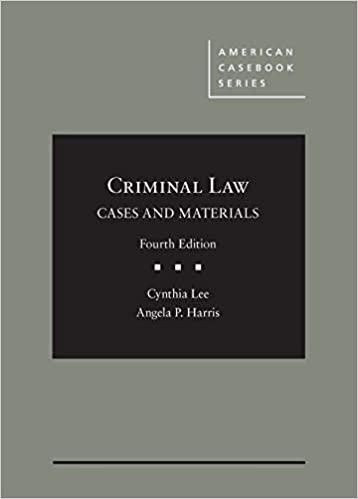Question
Please prepare the following for discussion: What are the functions of tort law? According to Nettleship v Weston [1971] 2 QB 691, the learner driver
Please prepare the following for discussion:
- What are the functions of tort law?
- According to Nettleship v Weston [1971] 2 QB 691, the learner driver is expected to show all the skill of a reasonable experienced driver no matter how prominently the 'L' plates are displayed. Is this fair? In answering the question, consider the reasoning of Lord Denning MR [1971] 2 QB 691, 703:
The high standard ... imposed ... is, I believe, the result of the policy of the Road Traffic Acts. Parliament requires every driver to be insured against third party risks. The reason is that a person injured by a motor car should not be left to bear the loss on his own ... But the injured person is only able to recover if the driver is liable in law. So the judges see to it that he is liable ... Thus we are, in this branch of the law, moving away from the concept 'No liability without fault'. We are beginning to apply the test: 'On whom should the risk fall?' Morally the learner driver is not at fault; but legally she is liable ... because she is insured and the risk should fall on her.
- What are the main differences in establishing liability in contract, criminal and tort law?
- Does England have a 'compensation culture'?
- 'The #Metoo movement, which started just over a year ago, has brought to the surface the prevalence of sexual abuse. ... The interplay between criminal and civil proceedings can be confusing for the layperson. Victims can pursue alleged abusers even if the accusations have not been proven in criminal proceedings. Even stranger is how the defendant can be acquitted but then still be sued in civil proceedings.
This raises fundamental questions about justice and double jeopardy. Imagine a defendant who successfully fought allegations of sexual abuse in criminal proceedings. As they leave court, that person might be forgiven for thinking that that was an end to the matter. Instead, that same person could find themselves being sued and having to stand civil trial.At the close of the civil trial, the Judge might find them to have committed the wrongful act and order them to pay compensation to the other side.' (E. Cote, Sexual Abuse Compensation: Civil Claims for Criminal Allegations', at https://www.kingsleynapley.co.uk/insights/blogs/medical-negligence-and-personal-injury-blog/sexual-abuse-compensation-civil-claims-for-criminal-allegations).
Discuss.
DUTY OF CARE I
- Do you agree with the following: 'It is preferable, in my view, that the law should develop novel categories of negligence incrementally and by analogy with established categories ...' (Brennan J in the High Court of Australia in Sutherland Shire Council v Heyman (1985) 60 ALR 1, 43-44)?
Step by Step Solution
There are 3 Steps involved in it
Step: 1

Get Instant Access to Expert-Tailored Solutions
See step-by-step solutions with expert insights and AI powered tools for academic success
Step: 2

Step: 3

Ace Your Homework with AI
Get the answers you need in no time with our AI-driven, step-by-step assistance
Get Started


